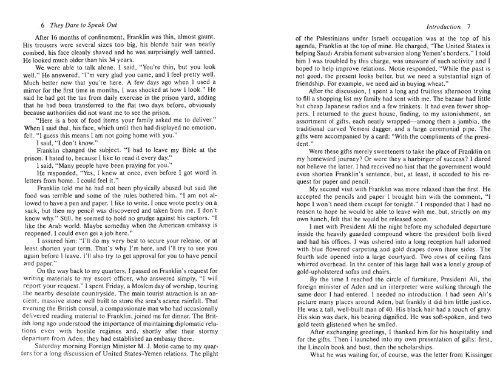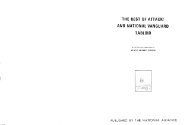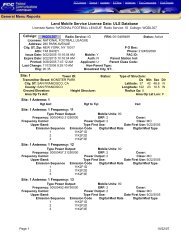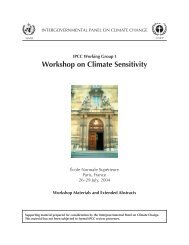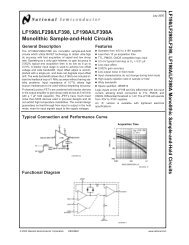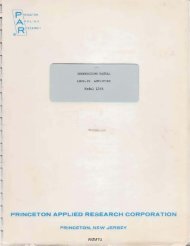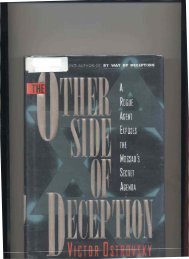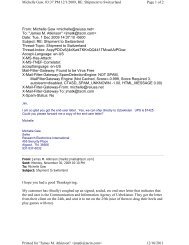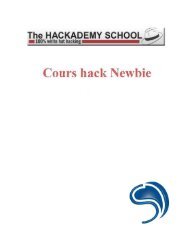They Dare to Speak Out
They Dare to Speak Out
They Dare to Speak Out
Create successful ePaper yourself
Turn your PDF publications into a flip-book with our unique Google optimized e-Paper software.
· 6 <strong>They</strong> <strong>Dare</strong> <strong>to</strong> <strong>Speak</strong> <strong>Out</strong><br />
After 16 months of confinement, Franklin was thin, almost gaunt.<br />
His trousers were several sizes <strong>to</strong>o big, his blonde hair was neatly<br />
combed, his face cleanly shaved and he was surprisingly well tanned.<br />
He looked much older than his 34 years.<br />
We were able <strong>to</strong> talk alone. I said, "You're thin , but you look<br />
well." He answered, "I' m very glad you came, and I feel pretty well.<br />
Much better now that you 're here. A few days ago when I used a<br />
mirror for the first time in months, I was shocked at how I look." He<br />
said he had got the tan from daily exercise in the prison yard, adding<br />
that he had been transferred <strong>to</strong> the flat two days before, obviously<br />
because authorities did not want me <strong>to</strong> see the prison.<br />
"Here is a box of food items your family asked me <strong>to</strong> deliver."<br />
When I said that, his face, which until then had displayed no emotion,<br />
fell. "I guess this means I am not going home with you. "<br />
I said, "I don't know."<br />
Franklin changed the subject. "I had <strong>to</strong> leave my Bible at the<br />
prison. I hated <strong>to</strong> , because I like <strong>to</strong> read it every day."<br />
I said, "Many people have been praying for you."<br />
He responded, "Yes, I knew at once, even before I got word in<br />
letters from home. I could feel it."<br />
Franklin <strong>to</strong>ld me he had not been physically abused but said the<br />
food was terrible and some of the rules bothered him. "I am not allowed<br />
<strong>to</strong> have a pen and paper. I like <strong>to</strong> write. I once wrote poetry on a<br />
sack, but then my pencil was di scovered and taken from me. I don't<br />
know why." Still , he seemed <strong>to</strong> hold no grudge against his cap<strong>to</strong>rs. "I<br />
like the Arab world. Maybe someday when the American embassy is<br />
reopened, I could even get a job here."<br />
I assured him: "TIl do my very best <strong>to</strong> secure your release, or at<br />
least shorten your term. That's why I'm here, and I'll try <strong>to</strong> see you<br />
again before I leave. I'll also try <strong>to</strong> get approval for you <strong>to</strong> have pencil<br />
and paper."<br />
On the way back <strong>to</strong> my quarters, I passed on Franklin's request for<br />
writing materials <strong>to</strong> my escort officer, who answered simply, "I will<br />
report your request." I spent Friday, a Moslem day of worship, <strong>to</strong>uring<br />
th e nearby desolate countryside . The main <strong>to</strong>urist attraction is an ancient,<br />
massive s<strong>to</strong>ne well built <strong>to</strong> s<strong>to</strong>re the area's scarce rainfall. That<br />
evening the British consul, a compassionate man who had occasionally<br />
delivered reading material <strong>to</strong> Franklin, joined me for dinner. The British<br />
long ago unders<strong>to</strong>od the importance of maintaining diplomatic relations<br />
even with hostile regimes and, shortly after their s<strong>to</strong>rmy<br />
departure from Aden, they had established an embassy there.<br />
Saturday morning Foreign Minister M. 1. Motie came <strong>to</strong> my quarters<br />
for a long discussion of United States-Yemen relations. The plight<br />
Introduction 7<br />
of the Palestinians under Israeli occupation was at the <strong>to</strong>p of his<br />
agenda, Franklin at the <strong>to</strong>p of mine. He charged, "The United States is<br />
helping Saudi Arabia foment subversion along Yemen's borders." I <strong>to</strong>ld<br />
him I was troubled by this charge, was unaware of such activity and I<br />
hoped <strong>to</strong> help improve relations. Motie responded, "While the past is<br />
not good, the present looks better, but we need a sub stantial sign of<br />
friendship. For example, we need aid in buying wheat."<br />
After the discussion, I spent a long and fruitless afternoon trying<br />
<strong>to</strong> fill a shopping list my family had sent with me. The bazaar had little<br />
but cheap Japanese radios and a few trinkets. It had even fewer shoppers.<br />
I returned <strong>to</strong> the guest house, finding , <strong>to</strong> my as<strong>to</strong>nishment, an<br />
assortment of gifts, each neatly wrapped-among them a jambia, the<br />
traditional curved Yemeni dagger, and a large ceremonial pipe. The<br />
gifts were accompanied by a card: "With the compliments of the president."<br />
Were these gifts merely sweeteners <strong>to</strong> take the place of Franklin on<br />
my homeward journey? Or were they a harbinger of success? I dared<br />
not believe the latter. I had received no hint that the government would<br />
even shorten Franklin's sentence, but, at least, it acceded <strong>to</strong> his request<br />
for paper and pencil.<br />
My second visit with Franklin was more relaxed than the first. He<br />
accepted the pencils and paper I brought him with the comment, "I<br />
hope I won't need them except for <strong>to</strong>night." I responded that I had no<br />
reason <strong>to</strong> hope he would be able <strong>to</strong> leave with me, but, strictly on my<br />
own hunch, felt that he would be released soon.<br />
I met with President Ali the night before my scheduled departure<br />
inside the heavily guarded compound where the president both lived<br />
and had his offices. I was ushered in<strong>to</strong> a long reception hall adorned<br />
with blue flowered carpeting and gold drapes down three sides. The<br />
fourth side opened in<strong>to</strong> a large courtyard. Two rows of ceiling fans<br />
whirred overhead. In the center of this large hall was a lonely group of<br />
gold-upholstered sofas and chairs.<br />
By the time I reached the circle of furniture, President Ali, the<br />
foreign mini ster of Aden and an interpreter were walking through the<br />
same door I had entered. I needed no introduction. I had seen Ali's<br />
picture many places around Aden, but frankly it did him little justice.<br />
He was a tall , well-built man of 40. His black hair had a <strong>to</strong>uch of gray.<br />
His skin was dark, his bearing dignified. He was soft-spoken, and two<br />
gold teeth glistened when he smiled.<br />
After exchanging greetings, I thanked him for his hospitality and<br />
for the gifts. Then I launched in<strong>to</strong> my own presentation of gifts: first,<br />
the Lincoln book and bust, then the scholarships.<br />
What he was waiting for, of course, was the letter from Kissinger


